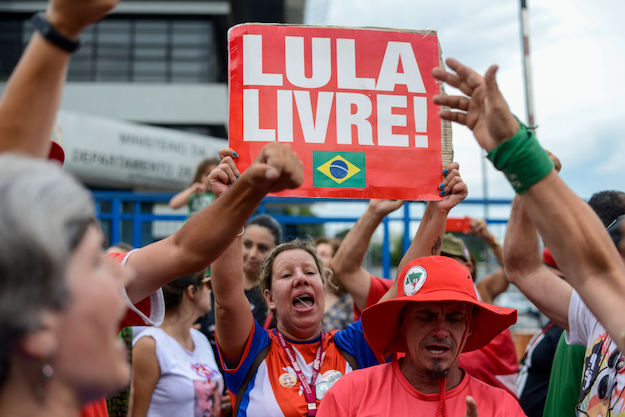SÃO PAULO – Ever since Jair Bolsonaro’s election as president last October, Brazil’s opposition has been in tatters. Reeling and unable to respond to the president’s rapid-fire absurdities, left-of-center parties have been largely transformed into spectators. Cabinet infighting and Bolsonaro’s behavior have dominated headlines, and led to growing discontent among moderates over the president’s style of governing. But a leaderless opposition has failed to articulate its own competing narrative.
Recent events suggest this trend will continue – and that in the opposition’s struggle to find a new identity, hardliners will have the upper hand.
Take Congress’ approval of a pension reform bill last week. Given the urgent need for reform, a few members of the opposition, among them 25-year-old moderate Tabata Amaral, broke with their parties and supported the bill. Amaral, for one, was vilified as a traitor by the radical left and may yet be expelled from her party – despite clear evidence that a majority of voters supported the reform.
But if the opposition turns its back on moderate voters, it does so at its own peril. Bolsonaro’s victory cleared a path for Brazil’s left to regain its footing and recover its ability to set the political agenda. But that will require a change of vision. Specifically, the Workers’ Party (PT), the largest and still most relevant opposition party, needs to make peace with its recent past. A sweeping apology for past corruption (going beyond the current narrative of a few rotten apples), and acceptance that former President Dilma Rousseff’s economic agenda was ill-conceived would go a long way toward bringing moderate voters back into the fold. So too would putting an end to claims that Rousseff’s impeachment was a coup d’état.
To occupy the center, the opposition needs to focus on the public debates that matter most to Brazilians, but that they have ceded to right-wing parties. That includes public security, corruption and reforms to get the fiscal deficit under control to restart economic growth. The PT should also atone for its foreign policy mistakes, including past support for Hugo Chávez and Nicolás Maduro that helped enable what has become one of the world’s worst humanitarian crises. This new left could articulate a vision similar to that of former President Luiz Inácio Lula da Silva’s own position in 2003, with moderate economic policy and innovative ideas about combating inequality.
Such a scenario may already have been unlikely – but the recent Lava Jato leaks (now known as Vaza Jato, or in a free translation a “Leak Express”) have made it even more difficult.
The leaks raised serious doubts about the legality of Lula’s conviction on corruption charges and, given the former president’s position in the polls ahead of the vote, questions about last year’s election. Most observers initially predicted the revelations, published bit by bit on The Intercept in cooperation with other news outlets, would be bad news for the Bolsonaro government. But while the leaks have negatively affected the reputation of Justice Minister Sérgio Moro, they seem not to have affected the president’s approval ratings. The roughly one-third of Brazilians who approve of Bolsonaro’s government, and who have already forgiven a long list of scandals that would have undone most political careers, seem not to be too concerned by revelations about illegalities committed during Lula’s prosecution.
Instead, it seems that it is the PT, and the opposition as a whole, that will be most negatively affected by the leaks. Moderate members of the opposition who are in favor of leaving the past behind, looking for renewal and following the script described above, suddenly face far more energetic resistance from those who say that the PT’s priority should be to right the wrongful conviction of its most venerated leader. Vaza Jato makes turning the page a far less realistic proposition.
As the past six months have shown, prioritizing the “Lula Livre” (Free Lula) strategy means crowding out a narrative of renewal that could attract voters back to the left. By prioritizing Lula’s redemption, the party will struggle to build up a new leader who is unafraid to break with the past and capable of embodying an attractive, forward-looking vision the party needs to become electable again.
Unless the moderates gain the upper hand, the opposition will consign itself to the margins. One less obstacle for Bolsonaro as he looks towards his re-election in 2022.








